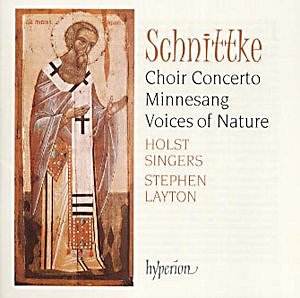Those who know Schnittke as a master of the grotesque,
the trashy or the avant garde would be as surprised to hear this CD
as his supporters in the Soviet era were when this magnificent concerto
for choir first appeared in 1981. But Russian artists, even the non-devout,
have always drawn inspiration from the Orthodox tradition, and few who
know Tchaikovsky’s Liturgy of St John Chrysostom or Chekhov’s
story The Student would deny that they have reached the highest
peaks of inspiration under its spell. Schnittke, massively popular in
his own country, seemed to address a deep psychological need in the
Russian people, one that could not be ordinarily articulated or resolved
in Soviet times. That Schnittke’s investigation of the Russian mindset
should find a choral outlet in the Orthodox tradition should, with the
wisdom of hindsight, be no surprise.
Schnittke took liberties that less talented composers
would not have been forgiven (many of his orchestral works contain electric
guitars mainly, I contend, because they were frowned upon). These include
the religious text of this Concerto For Mixed Chorus, drawn from the
writings of a tenth century Armenian monk Grigor Narekatsi. They are
stunningly beautiful, even in translation, a voice of devotion from
one of the world’s oldest Christian communities. Schnittke’s modal writing
is simple, extremely expressive and decisively Russian. Some have expressed
reservations as to the quality of this concerto, mostly concerning its
unchanging texture, but few fail to respond to its immense power, and
I have no doubt in calling it a masterpiece. Part and Taverner sound
like little boys beside a work that explores real spiritual depths.
The Holst Singers, a non-professional choir based in
London, have done an excellent job. They do not have the authority of
the Svetlanov (who gave the first performance) version on Chandos, but
they sing wonderfully. They have a beautiful, cool sound in the best
British tradition, and the deep bass voices bring forth some glorious
noises. I suspect that the Russian language pronunciation is not perfect,
but such are the dense textures of the Concerto this is not a hindrance
that will concern most listeners.
The fillers do not reach such heights. Voices of
Nature is one of those slight works that Schnittke produced occasionally.
For vibraphone and wordless chorus, it doesn’t seem to do very much,
and it doesn’t really stick in the memory, but it sounds nice.
Minnesang is a much more earthly and complex
work exploring the legacy of the medieval German Minnesangers, aristocratic
predecessors to the Meistersingers. It sets a medieval German text concerning
love, although Schnittke treats the words completely phonetically, claiming
the meaning to be unimportant. It is a skilful work, building interesting
textures in crescendos, although it never feels particularly important.
This disc is hugely welcome. The sound of a composer
under the yoke of communism trying to explore matters of the spirit
whilst forbidden to make expressly devotional music is fascinating and,
ultimately, uplifting.
Aidan Twomey


